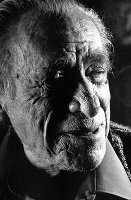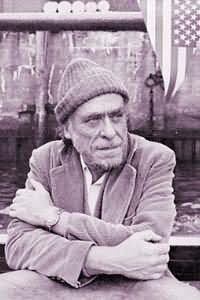 "Beating me with that strap taught me something.""What did it teach you?""How to type."-Charles Bukowski, from an 1981 interview.
"Beating me with that strap taught me something.""What did it teach you?""How to type."-Charles Bukowski, from an 1981 interview.Many of my strongest memories of
Charles Bukowski come not so much from the actual words he wrote, the poems and stories that would stay with me for years and years, but from the experiences and surroundings that enveloped me as I discovered him. Originally this was going to be a review of the new DVD documentary BUKOWSKI: BORN INTO THIS, but as I sat and watched the film (which was great), and heard those dusty, forlorn poems again, those memories returned.
It was
William S. Burroughs that got me into Bukowski, but it wasn't his writings, nor any of the Beat writers of that time, which is fitting because when I think about Bukowski, and I think about those other writers, fine writers all, who built their lives and their moments on the experimentation and ride of life, the ride of drugs, the thrill of experience and the underground bop and jazz of the "cult" culture, I always see Hank as the antithesis of it all, the pocked-marked man scowling in the corner at the rest, drinking his wine and stripping his words down until there was nothing left except his life - dirty and stinking, smelling of cigarettes, beer and horses. Point of fact, my first experience with Bukowski wasn't his poetry at all, it was a biography I found called
HANK by
Neeli Cherkovski. I only stumbled upon it because for some reason the person who restocked the college library shelves stuck it in with the Bukowski stuff, which came before the Burroughs stuff, which was what I was looking for at the time when I first saw that scarred face adorning the front jacket.

I skipped the next few days' worth of classes to entrench myself in the corner desk next to that particular book shelf and read the book front to back. This is my clearest memory - sitting at the desk, my class books shielding my from people I might know who would ask why the hell I wasn't in class and I just read, read and soaked up every word I could. The first fiction I read turned out to be his last novel published while he was alive,
Pulp: a scathing mish-mash of noir and SF that was a homage to the city that he called home both in life and in print - L.A. It was only after that I managed to get my hand on a book of his poetry.
The first actual poem I remember reading came from
Play the Piano Drunk Like a Percussion Instrument Until the Fingers Begin to Bleed a Bit, and was called
The Night I Was Going to Die. I had been having a recurring problem when sleeping, where I would be awake but paralyzed, unable to breathe, and would only be able to move after literally rolling myself off the bed. There was always that fear that I would fall right through the bed, through the floor and die. So at the time it was a revelation when I read these words that begin the poem:
The night I was going to die
I was sweating on the bed
and I could hear the crickets
and there was a cat fight outside
and I could feel my soul dropping down through the
mattress
Bukowski had a hard life, and his writing reflects that. There is no pretense; this is writing so autobiographical it was at times painful to read. Even the parts that were outright fiction were true. From his brutal childhood at the hands of a German father that ruled by the rod to his lonely acne-riddled adolescence to his life as a drunk, hulking ugly scarred man looking to scrap a living out at the Post Office and the horse track, all the while writing, writing to live, writing to find something that could reflect what he saw in his eyes every day walking the streets of Los Angeles in the 50's to the 90's when he finally died. While everyone else from Burroughs to
Kerouac to
Ginsberg were working into different and more extreme writing styles like the cut-up made popular in Burroughs' writing to the stream of consciousness that populated Kerouac later works, Henry "Hank" Charles Bukowski, jr. was stripping everything away, simply seeing the poetry in the sad drunk love weary world around him, and communicating it in a way that was soft and hard, gruff and tearful, but always grounded in the dirt and dust was the beauty of a man's life, a life laid bare in the pages found in a college library in 1991.
There are few people whose work and life struck or continue to strike this type of chord with me.
Shakespeare,
Zappa,
Coltrane,
Ellison,
Kurosawa. Charles Bukowski was another one of those people for me, the Hero of the Horse Track Poets.
 If you only know Roger Ebert as (forgive me) the "fat guy who gives movies "thumbs up or thumbs down"" then you really don't know Roger Ebert at all. Before the television show, before the "thumbs" there was and still is a giant of the written word, a master of film criticism and an unabashed lover of the movies. His Great Movie series of essays have broadened my film palette to include such luminaries as Jean-Pierre Mellville and Yasujiro Ozo, the "UP" series by Michael Apted, and the wonder of films like PEEPING TOM and PARIS, TEXAS. For years he's run his Overlooked Film Festival (now known as Ebertfest), which features both new and old films deserving of more recognition, and has famously taught films by dissecting them one shot at a time.
If you only know Roger Ebert as (forgive me) the "fat guy who gives movies "thumbs up or thumbs down"" then you really don't know Roger Ebert at all. Before the television show, before the "thumbs" there was and still is a giant of the written word, a master of film criticism and an unabashed lover of the movies. His Great Movie series of essays have broadened my film palette to include such luminaries as Jean-Pierre Mellville and Yasujiro Ozo, the "UP" series by Michael Apted, and the wonder of films like PEEPING TOM and PARIS, TEXAS. For years he's run his Overlooked Film Festival (now known as Ebertfest), which features both new and old films deserving of more recognition, and has famously taught films by dissecting them one shot at a time.

